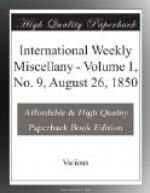open any proposition so as to identify its separate
elements with the very consciousness of the reader’s
or hearer’s mind; this, which is the lawyer’s
peculiar power, had not been particularly developed
in Burke, but exists in Webster in greater expansion
and force than in any one since Doctor Johnson, who,
it always appeared to us, had he been educated for
the bar, would have made the greatest lawyer that ever
led the decisions of Westminster-Hall. We should
hardly be justified in saying that Burke would have
made a great First Lord of the Treasury. Mr.
Webster, as Secretary of State, proved himself to be
a practical statesman of the highest; finest, promptest
sagacity and foresight that this or any nation ever
witnessed. Who now doubts the surpassing wisdom,
who now but reverences the exalted patriotism, of
the advice and the example which he gave, but gave
in vain, to the Whig party at the beginning of Mr.
Tyler’s administration? His official correspondence
would be lowered by a comparison with any state papers
since the secretaryship of John Marshall. Does
the public generally know what has become of that
portentous difficulty about the Right of Search, upon
which England and America, five years ago, were on
the point of being “
lento collisae duello.”
Mr. Webster settled it by mere force of mind:
he dissipated the Question,
by seeing through it,
and by compelling others to see a fallacy in its terms
which before had imposed upon the understanding of
two nations. In the essential and universal philosophy
of politics, Webster is second only to Burke.
After Burke, there is no statesman whose writings might
be read with greater advantage by foreign nations,
or would have been studied with so much respect by
antiquity, as Webster’s.
In a merely literary point of view, this perhaps may
be said of Mr. Webster, that he is the only powerful
and fervid orator, since the glorious days of Greece,
whose style is so disciplined that any of his great
public harangues might be used as models of composition.
His language is beautifully pure, and his combinations
of it exhibit more knowledge of the genius, spirit,
and classic vigor of the English tongue, than it has
entered the mind of any professor of rhetoric to apprehend.
As the most impetuous sweeps of passion in him are
pervaded and informed and guided by intellect, so
the most earnest struggles of intellect seem to be
calmed and made gentle in their vehemence, by a more
essential rationality of taste. That imperious
mind, which seems fit to defy the universe, is ever
subordinate, by a kind of fascination, to the perfect
law of grace. In the highest of his intellectual
flights—and who can follow the winged rush
of that eagle mind?—in the widest of his
mental ranges-and who shall measure their extent?—he
is ever moving within the severest line of beauty.
No one would think of saying that Mr. Webster’s
speeches are thrown off with ease, and cost him but
little effort; they are clearly the result of the




